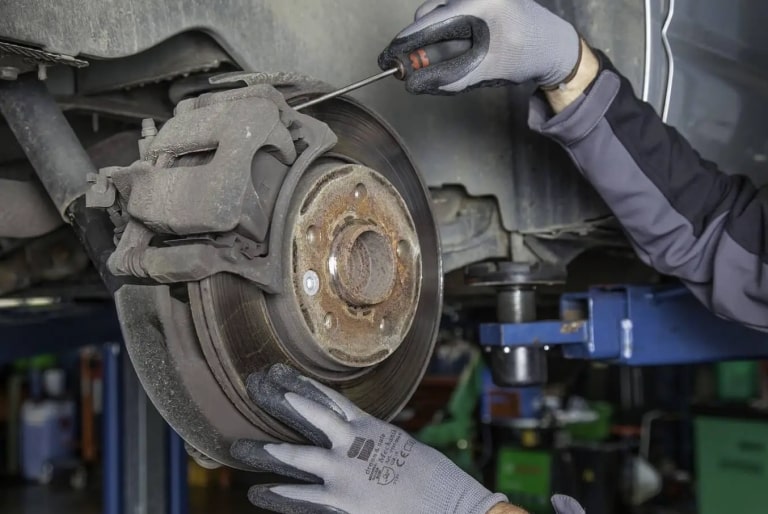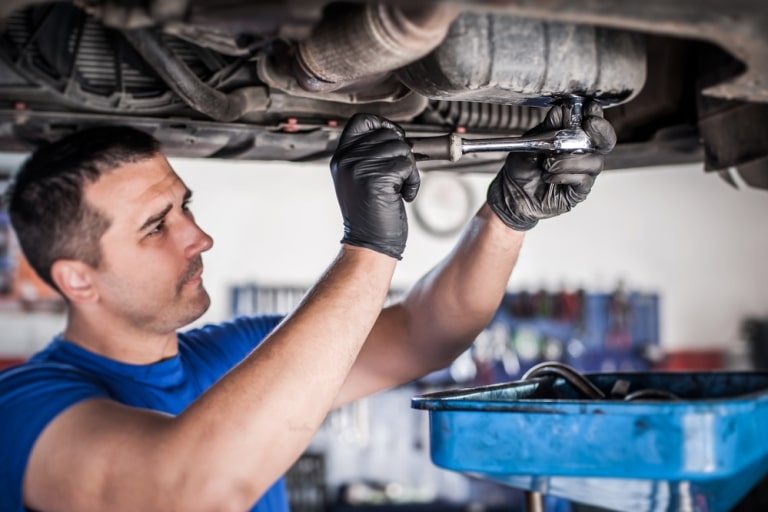Squeaking brakes are quite annoying and they’re also clear indicators that something is wrong with your car. In fact, ignoring the squeaks doesn’t only mean putting up with ear-piercing noise, but it’ll also lead to other problems down the road.
In some cases, you may notice that your brakes squeak only (or louder) when you back up, which can happen for a variety of reasons.
Depending on the factor behind the squeak, you’ll need to address the issue differently, so here’s a brief guide with some of the main reasons why brakes squeak while backing up.
1. Worn Brake Pads
Like most parts of your car, the brake pads are prone to thinning and wearing with continuous use due to friction.
If the brake pads are completely worn down, they’ll cause further damage to your brake system and rotors by grinding on them.
To solve this problem, many brake pad manufacturers design the brake pad with a wear indicator tab that starts squeaking when the pads thin out. In that case, replacing the brake pads should solve the problem.
You should keep in mind that the material of your brakes affects the squeaking noise. For example, metal pads are affordable and last for a long time but they’re very loud when they squeak.
If you want a silent alternative that lasts for a long time, you might want to go for ceramic pads, but they typically come at a higher price.
2. Rust, Moisture, and Corrosion
Another common reason for brakes to emit that screeching noise is rust build-up. If you live in an area where humidity is high or it has been raining or snowing overnight, a thin layer of rust can form between the rotor and the pads.
In that case, you’ll notice that the brake squeaking is louder in the morning and goes away after driving the car. This is because you chip away the layer of rust as you use your brakes a few times.
If you leave the car for a long time, the layer of rust might get thicker and more difficult to wipe away by barking. In that case, your mechanic will manually remove the rust by sanding it down or replacing heavily worn pads.
To avoid this issue in the future, park your car in an indoor garage or cover it when not in use.
3. Accumulating Dust and Debris Inside the Brake System
This one is fairly similar to the rust problem, but instead of moisture, tiny particles of dust find their way inside the brake system and become lodged between the brake pads and rotors.
As you apply the brakes, the friction between these particles and the brake system can cause a squeaking noise, which is usually accompanied by uneven braking.
A mechanic can quickly check the brake system and remove any dust or debris causing the problem. You can also remove most of the dust by using spray cleaners if you know your way around the brakes.
4. The Pads Come in Contact with the Brake Caliper
Another common reason for brake squeaking is having the brake pads rub against the brake caliper, which shouldn’t happen in normal situations.
This issue can happen in all kinds of cars, especially ones with 4-wheel disc brakes. While backing up, brake pads with flimsy anti-rattling clips can shift out of position and contact the caliper creating that noise.
Luckily, you can easily fix the problem by replacing the clip at the nearest auto shop.
5. Poor Lubrication
The brake system contains a variety of moving parts that all need to stay lubricated to work smoothly. This includes the pins, caliper slides, bushings, and brackets.
If the lubricant dries up or isn’t reapplied properly, squeaking will start to happen. In that case, some brake pads will wear down faster than others.
This is because the unlubricated brake pads stay partially applied even when you’re not pressing the brakes, leading to quicker wear and squeaking. Solving this problem should be fairly simple, as you only need to check the lubricant and reapply it if it’s not done properly.
6. Vibration and Loose Parts

As previously established, many parts of the brake system are meant to stay in place to function properly. This includes clips, rotors, pads, pins, and other essential parts of the brake system.
Unwanted friction between those parts can cause high-frequency vibration, which our ears interpret as squeaking noise. This issue can also happen when some parts are loose or aren’t installed properly during maintenance.
Depending on the situation, the vibration might only be produced when you drive in reverse, causing the squeak to happen only when you’re backing up.
7. Glazing and Overheating
The way you drive your car may also affect your brake condition. For instance, hard and repeated braking at very high speeds can cause glazing. A glazed brake pad happens when the brakes are heated to a very high temperature (due to friction while braking).
This causes the material inside the brakes to become too smooth to create effective friction against the rotor. If your driveway is at a downhill slope, the brakes might become glazed from continuous backing out and hard braking.
A temporary solution here is to take out the brake pads and sand them roughly. However, you also need to go a bit easier on the brakes so that the problem doesn’t happen again.
8. New Brakes
Lastly, if your brakes are recently installed and they start emitting such noise right away, you shouldn’t have to worry.
This usually happens because new brakes need a “break-in” period to get adjusted to your car’s rotors.
New brakes usually take a couple of miles of driving before the effect goes away. However, it might take a bit longer to subside while reversing.
Wrap Up
This marks the end of today’s guide that walks you through all the different reasons why your car brakes are squeaking while backing up.
As you can see, there are various reasons behind this annoying noise, but luckily, a simple inspection can help you identify most issues and fix them.
Frequently Asked Questions (FAQs)
1. Why are my brakes squeaking when I back up?
There are various reasons, including worn brake pads, rust, debris accumulation, contact with brake caliper, poor lubrication, and more.
2. How does rust affect my brakes’ noise?
High humidity or precipitation can cause a thin layer of rust to form between the rotor and the pads. This might make the squeaking louder, especially in the morning after the car has been stationary overnight.
3. What role does brake pad material play in the squeaking sound?
Metal brake pads are more affordable and durable but tend to be louder when they squeak. Ceramic pads are quieter but might be pricier.
4. How can debris inside the brake system cause a squeaking noise?
Dust particles can get lodged between the brake pads and rotors. The friction between these particles and the brake system can lead to the squeaking sound.
5. What should I do if my brake pads are rubbing against the brake caliper?
This issue can be fixed by replacing the flimsy anti-rattling clips at an auto shop, ensuring that the brake pads don’t come in contact with the caliper.
6. Why is lubrication essential in the brake system?
Proper lubrication ensures smooth operation of various brake components. Insufficient lubrication can cause some brake pads to wear down faster and create squeaking noises.
7. What is glazing, and how does it affect my brakes?
Glazing occurs when the brakes are heated to a high temperature, making the material inside the brakes too smooth to create effective friction against the rotor. Continuous hard braking, especially at high speeds, can cause this.
8. I’ve just installed new brakes, and they’re squeaking. Should I be worried?
No, new brakes often require a “break-in” period to adjust to the car’s rotors. The squeaking sound should subside after driving a few miles.
